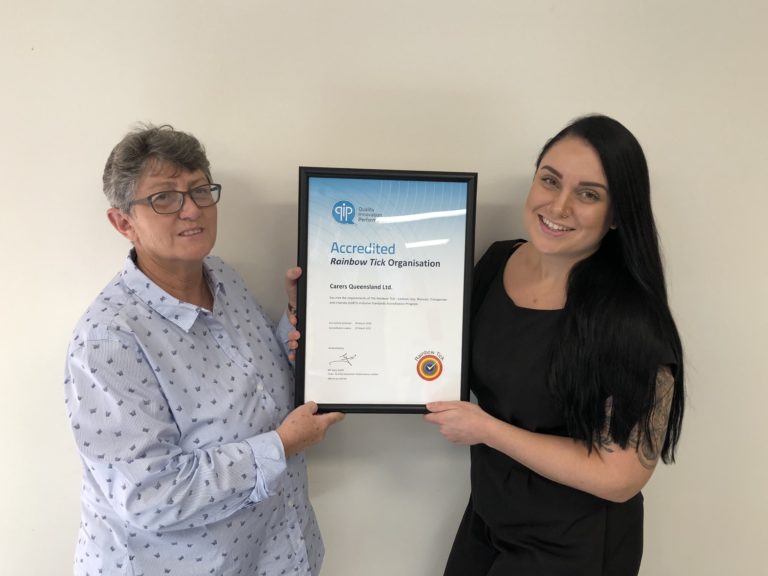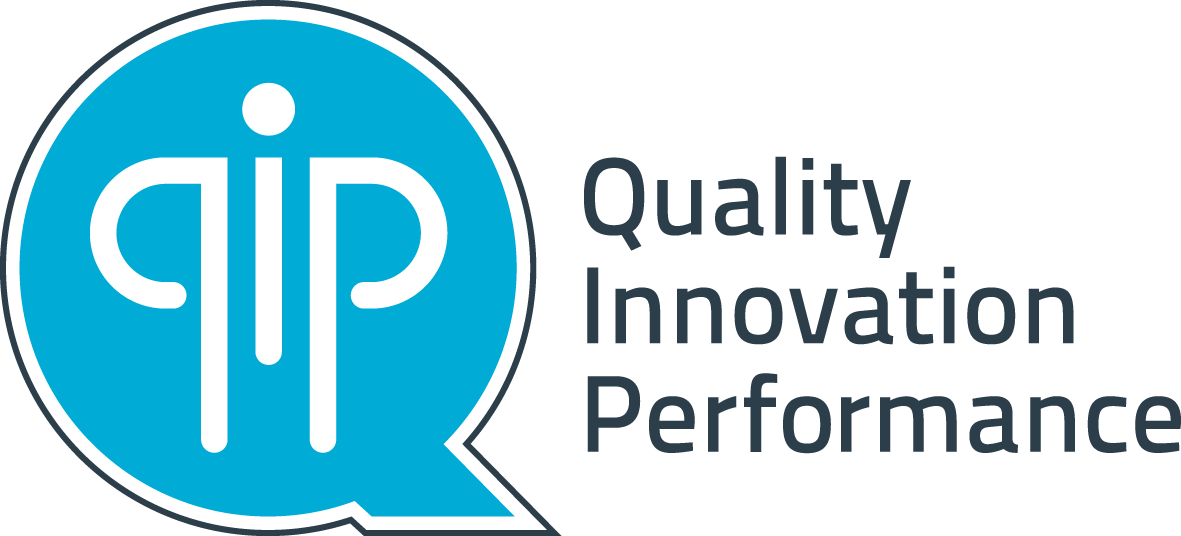Organisations in Focus
Carers Queensland

Successfully achieving their first cycle of accreditation against the QIC Health and Community Services Standards 7th Edition while also becoming the first not-for-profit organisation in Queensland to become Rainbow Tick accredited with QIP.
With one in every eight Australians caring for a family member or friend, Carers Queensland is committed to providing specialised carer, aged, and disability support services. Established in 1989, Carers Queensland represents and advocates on behalf of over 470,000 carers throughout Queensland.
For nearly 30 years, Carers Queensland has provided specialised carer, aged, and disability support services and has been working to advocate for equal rights, opportunities, and enhanced outcomes for families. They work within, and value, their local community, responding to unmet needs with care and respect, assisting those who are disconnected through high-quality personalised support.
Carers Queensland’s objective is to ensure carers achieve their goals, enhance their relationships, and can move forward with a life based on their own decisions and choices. They are also proud to be partnering with the National Disability Insurance Scheme (NDIS) to deliver the Local Area Coordinator Partners in the Community Program in Queensland including Ipswich, Toowoomba, Rockhampton, Brisbane North and South, Beenleigh, Robina, Caboolture/Strathpine and Maroochydore.
Earlier this year, Carers Queensland successfully achieved their first cycle of accreditation against the QIC Health and Community Services Standards 7th Edition (QIC Standards) as well as becoming the first not-for-profit organisation in Queensland to become Rainbow Tick accredited with QIP.

We spoke with Debra Cottrell, Chief Executive Officer, about Carers Queensland and their successful multi-accreditation process, with particular emphasis on their Rainbow Tick accreditation which they are especially excited about.
QIP Team: With such a large client base and vast geographical area how do you ensure each of your offices remains focused on quality client care?
Debra: We deliver meaningful outcomes across the community through a person-centred approach. Carers, the people they care for and their families are at the centre of everything we do; as such, we support self-directed services. We encourage their personal growth and empowerment and we work with them to improve their quality of life. Having offices embedded in local communities allows our staff to get to know the services and support options available for caring families, enhancing our ability to provide quality client care. Carers Queensland has a strong social media presence, which is updated regularly.
QIP Team: What type of content do you share and what advice do you have for other organisations wanting to launch into the social media space?
Debra: Social media is a two-way conversation. We use social media to interact with our audience and build real-time relationships. We focus on sharing good content that can add value. This can be information about the work we do and how we are making a difference in the community.
Social media works as a great avenue to scale up our communications. It also provides an opportunity to educate people on some relevant topics and inform them about events, news and different programs.
Some good advice for those wanting to launch into the social media space would be to understand their audience. People use social media because they want to engage, so we should all be ready for this two-way conversation. We speak and listen and we respond to their needs.
QIP Team: Congratulations on achieving multi-accreditation with QIC and Rainbow Tick in your first cycle of QIP accreditation. Why did you decide to become multi-accredited? What benefits has accreditation had for your organisation?
Debra: Carers Queensland has grown significantly over the last two years. This created a renewed focus on accreditation as a signal to others that we are an organisation that values, and has embedded, quality assurance and quality improvement processes across the whole organisation. Similarly, we believe that the Rainbow Tick signals to others that we welcome and support lesbian, gay, bisexual, transgender and intersex (LGBTI) people into our workspace.
QIP Team: Can you describe how your team worked together to achieve your first round of accreditation against the QIC Standards?
Debra: Our journey towards genuine LGBTI inclusion and accreditation commenced with the introduction of an online LGBTI awareness training module. Now integrated into the staff induction processes, all staff and volunteers were asked to set aside two to three hours to work through the module and then share their thoughts through staff supervision or in team meetings.
In parallel, we rolled out various communications to keep the regional staff up-to-date with why we were pursuing accreditation. Managing such an enormous workload required considerable planning by the Quality and Compliance team and the Rainbow Tick co-leads to ensure different processes dove-tailed together in a timely manner.
Communication is essential to maintaining everyone’s understanding of, and commitment to, the accreditation journey. A good sense of humour is also vital to maintaining a sense of perspective.
QIP Team: Carers Queensland were the first not-for-profit organisation to achieve Rainbow Tick accreditation in Queensland. How does your team feel about this achievement?
Debra: We are extremely proud of our achievement. The accreditation process means we have skilled up our staff to provide a culturally safe service to clients and staff who identify as LGBTI, with genuine respect for their experiences and history.
QIP Team: Why did you feel it was important for your organisation to be Rainbow Tick accredited?
Debra: Carers Queensland believes that all carers and the people they care for, regardless of their gender expression or identity, sexuality or intersex status should have the same rights, choices and opportunities as other citizens. However, we know from our own research that LGBTI people continue to fear a poor experience or discrimination when engaging with service providers.
We also know that LGBTI employees can be as much as 20% less productive if they are actively engaged in hiding their identity, editing their communication and avoiding personal conversations.
QIP Team: What does being Rainbow Tick accredited mean for your staff, volunteers and clients?
Debra: The Rainbow Tick provides a visual indication to our staff and volunteers, clients and potential clients that we are committed to affirming and respecting the dignity of people’s sexuality, gender identity, intersex status and relationships in a workplace free from discrimination.
Everyone has the right to feel and be safe in the workplace or office. Staff and volunteers should be able to bring their whole selves to work and clients and potential clients have the right to be valued, respected and have their sexual orientation, gender identity and relationships affirmed.
QIP Team: Do you have any advice for other organisations preparing to undergo QIC and/or Rainbow Tick accreditation?
Debra: Community and client consultation is really important in the early stages. Our LGBTI Allies Working Group has and continues to contribute to our ongoing implementation processes. We are constantly looking at opportunities to upskill our staff and education, information and learnings need to be available in multiple formats (fact sheets, face-to-face training, online, discussion groups etc).
It is also important to ‘take everybody in the organisation’ on the accreditation journey. Board members, staff, volunteers and clients have so much to contribute in terms of good ideas, areas for improvement, how change can be integrated successfully and sustainably. Equally, it is important to seek the advice and mentorship of other organisations who have achieved accreditation.



